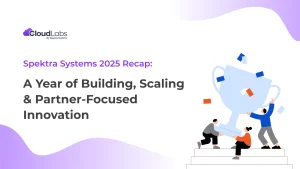As a Cloud Solution Provider, growth and scale will always be on top of your mind to facilitate a positive top line and organizational success. When thinking about expansion and scale, the focus generally is to acquire new customers across industries and business types. Though a larger customer base looks good for business, providing the same level of CSP support to all industries with similar features and capabilities can be difficult to sustain. When you sell same products to customers across different industries may not be able to solve the deeper business problems your customers might be facing.
Instead of attempting to solve every industry’s problem, focusing on one industry, and diving deeper to understand their business needs can help you in developing focused, value-driven capabilities. This suggests you need to adopt a vertical approach of deep dive than horizontal approach of industry type expansion. When you focus on provisioning industry-specific solutions you can become the leader of that niche. You might feel that as a Microsoft CSP, you are simply selling Microsoft products, and how can that be different for different industries. However, if you look closely, you will realize that every industry leverages and engages with Microsoft products in a specific manner.
Selling is becoming more difficult day by day as buyers are better informed than ever before. They have complete knowledge of the product of service quite early in the sales cycle which can lead to commoditizing almost all business solutions. When marketing to a large customer base you have less control over the sales cycle as you are not sure of your target industry. The lesser control you have during the sales journey the fewer chances you get to show the buyer your differentiator. Industry-focused expertise can help you earn short as well as long-term profits.
Key benefits of industry specialization for CSPs
Before we jump to the best practices to facilitate vertical industry expertise for revenue growth, let’s quickly understand the top benefits for CSPs that such a move can bring along.
1. Better margins
Industry-specific solutions have higher margins. Customers are willing to pay more for a solution that addresses the pain points of their business and makes their day-to-day operations more efficient and productive. Customers see value in your solution allowing you to improve your pricing structure. You have to worry less about price competition and discounting resulting in making your CSP business more profitable.
2. Competitive advantage
When you have industry-specific expertise, it will act as a potential barrier for others to enter that market and compete directly. You will have to deal with limited competition in a particular business line. Providing industry-specific solutions will act as a differentiator and competitive advantage in the minds of your existing and prospective customers. The lesser competition will translate into more business and revenue options for you.
3. Customer retention
Acquiring new customers requires a lot more effort and costs as compared to retaining the existing ones. Conversely, the revenue potential from existing customers can be much higher for your CSP business than new ones. When you are focused on a particular industry, you can pay more attention to your customers. You are in a position to provide an improved customer experience, address industry-related business problems and offer solutions. You can provide exceptional services right from the start of the purchase journey to usage, technology adoption, renewals, troubleshooting, etc. Better services will lower the churn and help you gain loyal, long-term clients. As a CSP, customer retention is important for driving revenue and focusing on business success, which industry expertise can help you achieve.
4. Higher lead conversions
When you sell industry-specific solutions, the length of the sales cycle is greatly reduced, and you can close more deals faster. As customers find your CSP and value-add solution industry-specific which solves their issues, they need not look at generic solutions for their business needs.
5. Effective marketing campaigns
When you have a specific industry segment as your prospective buyer, you can run marketing campaigns to cater to that particular audience. Targeted marketing campaigns are more effective and productive in terms of getting noticed by potential buyers and making an impact on the decision-makers. As your solutions will be industry-specific, the marketing campaigns will also be focused on highlighting the particular business solutions you can offer.
Top 4 ways to build industry expertise for CSPs
Now that you understand how focusing on a specific industry makes sense for your CSP business, let’s explore four ways in which you can achieve the same.
1. Choose the industry
The first step is to decide which industry you want to focus on. Choose an industry where you feel you can have a significant market share. For this, you can begin with determining the needs of different industries, the current competitive landscape, industry trends, and finally, assess your strengths and capabilities. As a CSP, you may want to look at the current customers you are serving and which industry the majority of them belong to.
The next step is to rank the industries, this could be done based on the pain points the industries face, especially with respect to on premise solutions. You need to focus on industries that already have or are in the process of moving to the cloud, hence, creating an opportunity for your CSP business. When deciding on the industry you wish to offer solutions, assess your expertise and ability to cater to that industry. You can also try to enter a market that is highly disruptive and has a rapid growth rate. Such businesses will be more open to adopting cloud solutions to improve their operations.
2. Understand business challenges
Every industry has its own set of challenges and specific problems. Once you have narrowed down the industry, you have to research and understand the problems faced by your prospective buyers. Industry knowledge can be a huge asset in diagnosing business challenges and recommending solutions. However, simply understanding the business challenges is not enough. You need to also make a case about how cloud services can help address the same and the value add you bring to the table as a CSP. It will be useful if you can find out how the businesses are currently addressing these challenges and how much are they paying for them.
3. Identify the need for change
Next, you should identify the drivers for change. You need to analyze the factors that can trigger a business to move to the cloud or leverage different Microsoft offerings. These could be related to operational efficiencies, cost-optimization, need for better security, loss of existing business, cost overruns, etc. This will help you in creating marketing content to address these triggers and make them more engaging, leading to higher conversion rates.
4. Build solutions
Stemming from the second point, the deep industry knowledge combined with technical expertise can aid in developing solutions as a CSP by bundling offers or value add services that are best suited for different operations within a business. If you want to minimize your risk at the beginning, you can start by selling generic but out-of-the-box offerings to a few specific industries. The product can be the same, but your use cases and approach to selling should be target-driven. Highlight the particular features of your CSP platform that can add value to a business.
Once you have a few customers of the same industry onboard, you can start engaging with them to find more specific problems they face and provide them solutions and bundled offerings. You can start small and slowly and steadily build solutions that are industry relevant.
Facilitate industry focus with CSP Control Center
As you focus on building industry focused expertise, you will realize that some aspects like the need for self-service, billing automation, administrative overheads, etc. are common to all. C3 with fine grained feature capabilities for reselling customer product/services and bundle offer can be leveraged here. Therefore, while you focus on customizing your CSP offerings to industry needs, these common needs and expectations can be taken care of by CSP Control Center or C3. Leverage this ultimate CSP productivity solution to streamline your business and focus on industry expertise. Book a demo today!
This blog was originally published on CSP Control Centre.



















